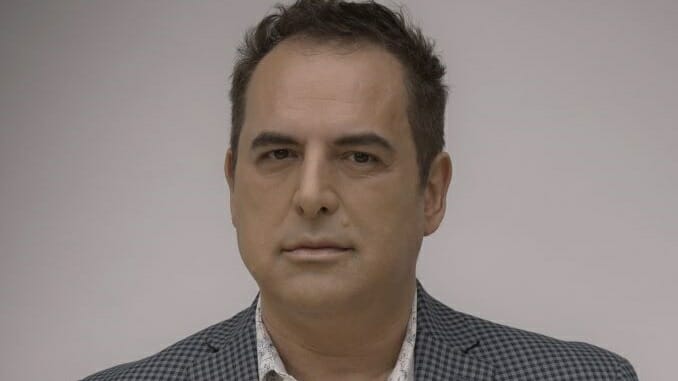Tom Scharpling Discusses His Memoir It Never Ends
Photo by Joel Fox
Early in It Never Ends, Tom Scharpling calls his shot. After laying out the three act structure the memoir takes on—you’ll laugh, you’ll cry, you’ll laugh in adulation—he writes, “My goal is that upon finishing this book you will have no choice but to rise from your seat and slow clap while looking at the cover, muttering under your breath, ‘That SOB did it. He really did it!’”
Such a declaration makes interviewing its author difficult. First, his ambitions are already out in the open, loud and proud, so where does one begin? Second, yeah, that SOB did it. He really did it!
It isn’t hard to root for Tom Scharpling, who has written for television shows like Monk and What We Do In the Shadows, directed music videos for the likes of Aimee Mann and the New Pornographers, and, in hosting The Best Show (first on New Jersey freeform radio station WFMU, then on its own), pioneered comedy podcasting. It Never Ends would have been satisfying enough had it stuck to a kind of road story format, but Scharpling took a decidedly more challenging route, plunging into his life as if anything less than a full accounting of it would be a waste of paper akin to a DJ Khaled self-help book.
It Never Ends is so much more. It contains stories that will be familiar to fans of Scharpling’s show—he tells an embarrassing story about Patti Smith early and writes of the freak car accident that nearly killed him the night of the 2016 election—but they’re handled much differently in prose than on the air, the light of the new medium revealing new facets that weren’t evident the first or second time around.
On the page, Scharpling’s stories are hilarious, heartbreaking, embarrassing, and, above all, honest—everything that makes memoirs as difficult to write as they are worth reading. It is also a book that is deeply invested in how it came to be, which is what Scharpling and I recently spoke about.

Paste: I want to start where the book starts, which is the story where you approach Patti Smith in an elevator and ask if she’d seen Humble Pie at their peak. It was interesting to see that story written out as opposed to how you’ve approached it on The Best Show. What changed by retelling it in prose?
Tom Scharpling: I’ve talked about a lot of the things in the book on the radio in some form or another, but I didn’t want the book to feel like it was just transcriptions from The Best Show, and I didn’t want to be overly flowery in the writing, either—so I was kind of trying to strike a balance between being conversational and literary, which changed the context for the framing of that story in the book. On The Best Show it was just, here’s what happened a week ago, whatever, however that went down. But in the book it’s like, here’s where my life was at, I’m taking a couple steps back, and it’s a lot different than what it was on the radio.
Paste: Was it hard to find a way into those stories that made them new in that regard?
Scharpling: It wasn’t the hardest part of writing the book, but it was a challenge to make sure that I was exploring everything to its utmost degree and mine each thing as deeply as I could where I might not necessarily do that on the radio because I’m saying it in real time. There’s a performative aspect of being on The Best Show, and that maybe caps how deep I can go with a thing in the moment. The book is a much more measured, contemplative process where you’d get a second chance and a third chance and a fourth chance to go over the material. On the radio, five minutes before I start telling the story I could have a whole other thing happen that will cast a shadow over the story—they’re not in a vacuum, which makes it a little different. The book is a self-contained world. I’m telling it to the reader and nothing is interfering with that. That’s a big part of why I waited, why so much of the book never got talked about on the air—I felt it wouldn’t be the best part to talk about certain things.
Paste: One of my favorite aspects of the book is that your narrative voice seems almost surprised that you’ve written a book, and that the reader is in the middle of reading it. That voice is a huge part of It Never Ends’ framework—how did it come together?
-

-

-

-

-

-

-

-

-

-

-

-

-

-

-

-

-

-

-

-

-

-

-

-

-

-

-

-

-

-

-

-

-

-

-

-

-

-

-

-








































